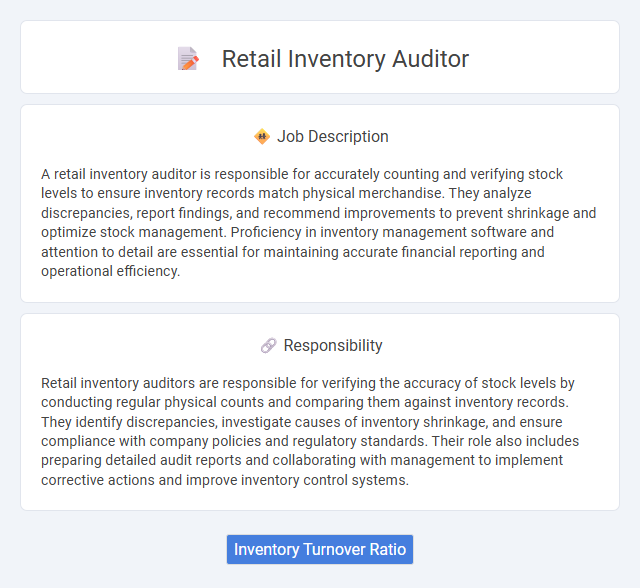
A retail inventory auditor is responsible for accurately counting and verifying stock levels to ensure inventory records match physical merchandise. They analyze discrepancies, report findings, and recommend improvements to prevent shrinkage and optimize stock management. Proficiency in inventory management software and attention to detail are essential for maintaining accurate financial reporting and operational efficiency.
Individuals with strong attention to detail and a methodical mindset are likely suitable for a retail inventory auditor role, as it requires careful examination of stock and accurate record-keeping. Those who prefer structured environments and possess good organizational skills may find this job fitting, given the repetitive and precise nature of inventory audits. Candidates who struggle with routine tasks or lack focus under pressure might find this position less aligned with their strengths.
Qualification
Retail inventory auditor positions require strong analytical skills and attention to detail, with proficiency in inventory management software and data analysis tools. Candidates typically need experience in retail operations, knowledge of stock control processes, and familiarity with auditing standards to ensure accurate inventory tracking. Effective communication skills and the ability to identify discrepancies and recommend corrective actions are essential qualifications for this role.
Responsibility
Retail inventory auditors are responsible for verifying the accuracy of stock levels by conducting regular physical counts and comparing them against inventory records. They identify discrepancies, investigate causes of inventory shrinkage, and ensure compliance with company policies and regulatory standards. Their role also includes preparing detailed audit reports and collaborating with management to implement corrective actions and improve inventory control systems.
Benefit
Retail inventory auditor roles likely offer benefits such as enhanced attention to detail and improved analytical skills, which could boost career prospects in finance and supply chain management. There is a strong probability that working in this position provides opportunities for professional growth through exposure to inventory control systems and auditing procedures. Employees may also experience job stability and competitive compensation due to the critical nature of inventory accuracy in retail operations.
Challenge
Retail inventory auditor roles likely involve the challenge of accurately tracking stock levels in dynamic store environments where frequent discrepancies may occur. The probability of encountering complex data reconciliation and identifying shrinkage or theft issues contributes to the job's demanding nature. Mastery of inventory management systems and attention to detail appear essential for overcoming these obstacles successfully.
Career Advancement
Retail inventory auditors possess in-depth expertise in stock management, quality control, and loss prevention, making them vital to optimizing retail operations. Gaining certifications in inventory management, data analysis, and retail systems can significantly enhance career prospects, leading to roles such as senior auditor, inventory manager, or operations analyst. Advancing in this field often involves mastering audit software, developing leadership skills, and understanding supply chain logistics to transition into strategic management positions.
Key Terms
Inventory Turnover Ratio
Retail inventory auditors play a critical role in monitoring and verifying stock levels to ensure accurate inventory records. Their work directly impacts the Inventory Turnover Ratio by identifying discrepancies that affect the frequency of inventory replenishment and sales performance. Accurate auditing helps optimize this ratio, improving inventory management efficiency and reducing holding costs.
 kuljobs.com
kuljobs.com